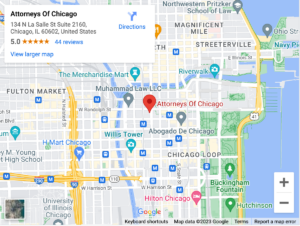
“Negligence” is a legal term of art that means something like “carelessness.” It is the most common justification for personal injury lawsuits. Car accidents are the most common type of personal injury claim, and most auto accident claims are based on negligence. Several different forms of negligence exist, however.
Ordinary Negligence
An assertion of ordinary negligence justifies most personal injury claims. To win an ordinary negligence claim, you need to prove the following:
- The defendant owed you a duty of care;
- The defendant’s behavior breached their duty of care;
- You suffered a personal injury (and associated harm, such as medical bills); and
- The defendant’s misconduct caused the harm you suffered.
You must prove all four of these elements with a likelihood of greater than 50% (a “preponderance of the evidence”).
Negligence Per Se
In Chicago as well as elsewhere in Illinois, negligence per se is an easy way of proving ordinary negligence. Instead of proving duty of care and breach of duty, you only need to prove that the defendant violated a safety statute. More specifically, you must prove that:
- The defendant violated a public safety statute;
- The statute was intended to protect people like the plaintiff; and
- The statute was designed to prevent the kind of injury that you suffered.
After you prove that much, you still have to prove that you suffered an injury and that the defendant’s violation of the statute was the cause of your harm. Once you establish negligence per se, it is the defendant’s responsibility to prove that they were not negligent. If they can’t do it, you win.
Gross Negligence
In Illinois, gross negligence means reckless conduct of the defendant that amounts to indifference to your life, your safety, or your rights. Gross negligence involves significantly greater misconduct than ordinary negligence does.
Gross Negligence and Waivers of Liability
Illinois courts generally refuse to uphold waivers of liability where the defendant’s conduct constituted gross negligence.
Gross Negligence and Punitive Damages
Illinois courts award punitive damages, if at all, in addition to economic and non-economic damages. The purpose of punitive damages is not to compensate you but to punish the defendant for their outrageous behavior. Nevertheless, if the court awards punitive damages, the money will still go to you. Courts only occasionally award punitive damages, even to victorious claimants.
To win punitive damages, you must prove that the defendant acted egregiously, such as with evil intent or extreme recklessness. Proving gross negligence will help you prove this level of culpability, but it may or may not be enough all by itself.
Special Case: Workers’ Compensation Claims
Workers’ compensation claims are reserved for work-related injuries. You cannot sue your employer for negligence even if they really were negligent. That’s okay, fortunately, because you don’t have to prove your employer was at fault to win. The amount of your compensation will be limited, however.
You can sue your employer for gross negligence if you also show that your employer was aware of the danger that caused your injuries and that they consciously refused to take any remedial measures.
Special Case: Product Liability Claims
If you suffered an injury due to a defect in a consumer product, you don’t have to prove negligence to win your claim. You must simply prove that the product was defective and unreasonably dangerous. That is because defects in a product’s design, manufacturing, and distribution are typically impossible to prove with specificity.
Criminal Negligence
Criminal negligence is a critically different concept than all of the above-described forms of negligence. First of all, criminal negligence applies to criminal trials, not to civil lawsuits. In a lawsuit, the defendant’s money is at risk. In contrast, the defendant’s freedom might be at risk in a criminal prosecution.
The concept of criminal negligence is how the court distinguishes between negligence that should be handled by the civil courts and negligence that should prompt a court to sentence a defendant to prison. In many cases, the same action can constitute both gross negligence and criminal negligence. A classic example is a DUI accident, which can result in both a civil lawsuit and a prison sentence.
The Burden of Proof Problem
It is possible for a defendant to win an acquittal in criminal court for exactly the same negligent conduct that resulted in a finding of liability by a civil court. The reason for this disparity is that the burden of proof in a criminal trial is much higher than the burden of proof in a civil lawsuit.
A Chicago Personal Injury Lawyer Can Help You Understand Your Rights
You never really know how much your personal injury claim is worth until you talk to a lawyer. Remember, it won’t cost you a dime to hire a Chicago personal injury lawyer unless they settle or win your case. Even then, their fee will amount to a percentage of the amount of your compensation. This incentive structure puts your lawyer on your side because after all, the more money you make, the more money your lawyer makes.
Contact Attorneys of Chicago Personal Injury Lawyers today to schedule a free initial consultation at (312) 929 2884.

